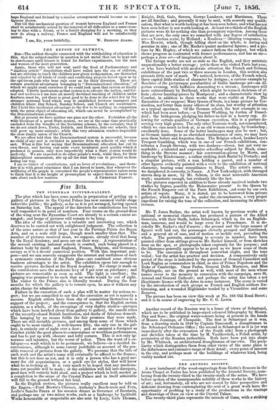THE REPOSE OF OLTiaPirs.
Sin—The saddest thought connected with the withholding of education is this, that the subject-matter in question is not metal that can be kept safe in storehouses until leisure is found for further experiments, but the men and women of the next genemtion.
Again, those who will not wait until the flood of Parliamentary and "slashing article" disquisition shall have rolled into the sea of oblivi but are striving to teach the children now given to this nation, are distracted and crippled by all kinds of crude and conflicting projects forced upon us by the epicurean gods who bear rule over us for their diversion. There are certain practical advantages belonging to "Denominational education," of which we might avail ourselves if we could look upon that system as finally adopted. Utterly inadequate as that system is to educate the nation, and for- mal and useless as I am sure all merely doctrinal teaching of children under fourteen must be, yet there is great good to be done to the select few by the stronger personal bond which may be established between managers and children where Day School, Sunday School, and Church are coextensive. But I hold this incidental advantage to the few to be nothing in comparison with the great object of educating all, which can never be accomplished by the Denominational system. But at present we have neither one plan nor the other. Forbidden all the wide blessings of a great State system, we are at the same time practically excluded from the benefits of the Sectarian scheme, by the certainty that if we do not admit Jews, Turks, Infidels, and heretics, into our schools, they will grow up mere animals; while this very admission renders impossible the close family union of the Church. We are often told that. the Denominational system is successful, because no child of any sect is excluded in praztice from the schools of any other sect. What is this but saying that Denominational education has cut its own throat, and having cast aside every incidental good quality which it professed to possess, only does imperfectly what a State system would do perfectly. We are expected to do other people's work, while they, for their philosophical amusement, stir up all the dust they can to prevent us from seeing our way.
I am no tinker of constitutions, and no lover of revolutions;, and there- fore it is with great reluctance that I am forced to learn, that whenever he wellbeing of the people is concerned the people's representative rulers seem to think that it is the height of presumption to expect them to know or to


































 Previous page
Previous page